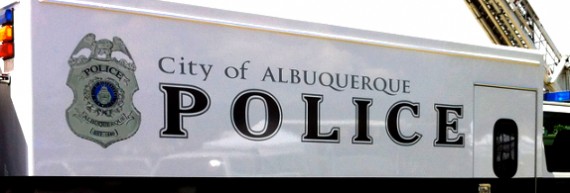Born from years of police shootings, scandals and lawsuits, a public process to reform the oversight of the Albuquerque Police Department (APD) is underway. In the second of three town halls, a special task force heard public testimonies September 17 at an Albuquerque community center.
Speaking from personal experience and historical memory, several residents of the Duke City urged a careful examination of police training procedures; questioned the implications of a current hiring campaign to employ military veterans; and raised the issue of law enforcement “militarization” in terms of war-like equipment acquisitions as well as the treatment of protestors.
A woman complained of carrying a bullet in her “rear end” and not being given the light of day by police called in to investigate a rowdy neighborhood and a violent dispute.
Convened by the city council-appointed Police Oversight Task Force, the event was held while the federal Department of Justice (DOJ) continued a probe into civil rights violations allegedly committed by Albuquerque Police Department officers in the shooting deaths of 18 mainly Latino men from 2010 to 2012.
“The reason we are all here is we have corruption within the police department, and that’s why the DOJ is here,” resident Ken Ellis Jr. told task force representatives. “Our community needs our police to be accountable for their actions.”
Ellis’ son, Iraq war veteran Kenneth Ellis lll, was shot to death by an APD officer in a 2010 confrontation. Earlier this year, the Ellis family won a multi-million court judgment against the City of Albuquerque, which then sought a new trial. Ellis showed up at this week’s meeting toting thick wads of paper he said were thousands of signatures on an earlier citizen petition that requested a DOJ investigation of police shootings.
“This city is terrified by the police department,” he contended. “I’ve heard so many stories of how people had their rights violated.” The military veteran and activist said more people were not at the meeting because of fears of police retaliation. About two dozen people attended the early evening session.
Another resident, Ben Lovato, said he went to the DOJ with information on two relevant incidents but was told the cases were not within the time frame investigated by the federal government. Lovato asked the ten task force members present for the meeting if any one of them had ever been arrested by APD. Not a single member answered positively.
A good amount of the evening’s discussion focused on police interactions with mentally disturbed persons, and the desirability of having officers wear lapel videos to document encounters. A 15-year resident of the Duke City, Rebecca Graham said she has not had a negative interaction with the APD, which includes “good officers” in its ranks, but has heard “horror stories” from other people, especially relating to the treatment of mentally ill people.
“It goes back to training,” Graham said.
A former reporter for the now-defunct Albuquerque Tribune and other media, David Lucero asserted there was a “systemic problem” in the local police department going back decades. Lucero, who sometimes covered the weekend police beat, recalled the 1972 police slayings of Antonio Cordova and Rito Canales, leaders of the Chicano activist Black Berets group, and the 1980 arrest of a young African-American man, Van Bering Robinson, for the murder of popular APD officer Phil Chacon.
“You could see (police) for a week, pulling over black people, males and females,” the retired teacher said of APD’s response to the Chacon murder. Robinson was found guilty of the crime, but his conviction was later reversed by the New Mexico Supreme Court.
Lucero recounted journalists’ problems in covering the alleged beating of two teenagers by undercover officers at a popular drag racing spot in southeast Albuquerque. For a new police oversight commission to be successful, Lucero later remarked to FNS, the members have to be “purer than Cesar’s wife” and not have conflicts-of-interest with the police department.
Andrew Lipman, task force chairman, invited public input in launching a new police oversight system for New Mexico’s largest city. In addition to an upcoming town hall scheduled for October 17 at the Cesar Chavez Community Center in southeast Albuquerque, the public is welcome at three regular task meetings set for October, Lipman told FNS.
After the town halls, the task force will synthesize the public testimonies and come up with recommendations for the city council by the end of December. At that point, it will be up to the elected body to act.
“It’s an open process and we’d like the public to engage in it,” Lipman stressed. “We need public support to get done what we need to get done.”
Ken Ellis Jr. assessed the task force as a start in revamping local law enforcement. “We have a unique opportunity to set up an oversight commission that’s Number One in the country..,” he said. “I’m optimistic, but cautiously.”
The police oversight reform process moves forward at the same time that the APD and public safety have become contentious issues in the three-way October 8 mayoral race. Defending reforms in the APD, Republican Incumbent Richard Berry claims crime is on the downswing in Duke City. A glossy Berry campaign mailer attacks Democratic rival Pete Dinelli for the latter’s alleged wrongdoings as head of the Safe City Strike Force during the previous administration of Democrat Martin Chavez. Dinelli criticizes the Berry administration for the reduction of APD personnel, while a third candidate, retired APD veteran Paul Heh, accuses the mayor of spinning public safety statistics and ignoring a huge driver of crime-drug addiction.
Additionally, five of nine city council seats are up for grabs in next month’s election, meaning some new faces might be on hand to receive the Police Oversight Task Force’s recommendations. A sixth seat held by Ken Sanchez, who attended this week’s police oversight town hall, is on the ballot but unopposed.
The 11-member task force charged with preparing the police oversight recommendations for the Albuquerque City Council includes individuals associated with the Martin Luther King Memorial Cente, LULAC, Disabilities Rights New Mexico and the ACLU, as well as retired APD and Sandia National Laboratories employees.
For more information on the Albuquerque Police Oversight Task Force and the times and locations of upcoming meetings, readers can go to:
http://www.cabq.gov/council/projects/current-projects/police-oversight-task-force
(Photo via Flickr by Rescunav.)




Responses to “Albuquerque Tackles Police Oversight”